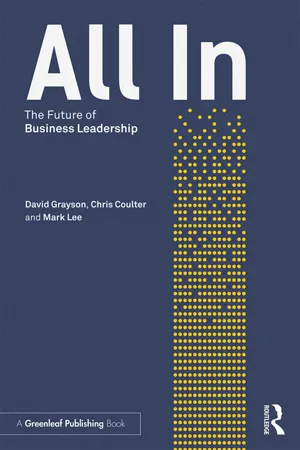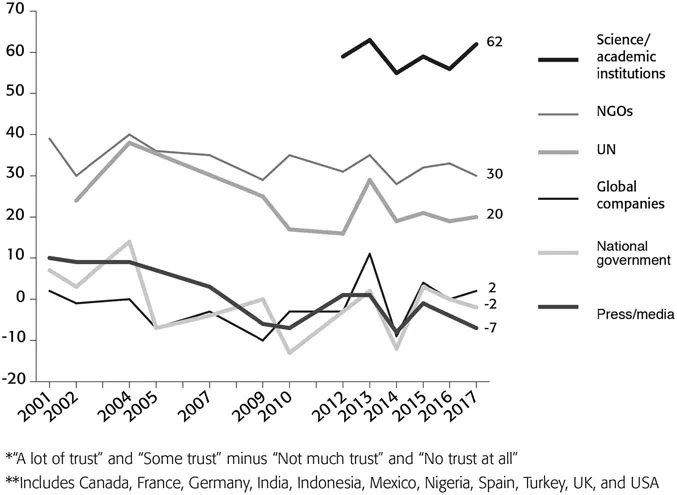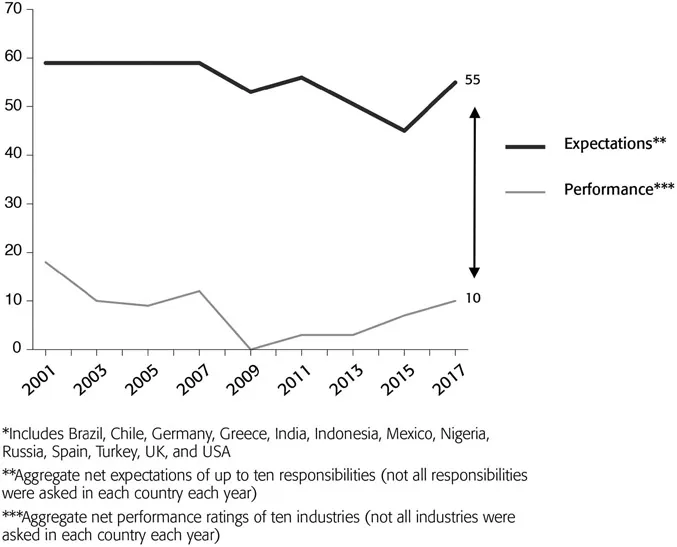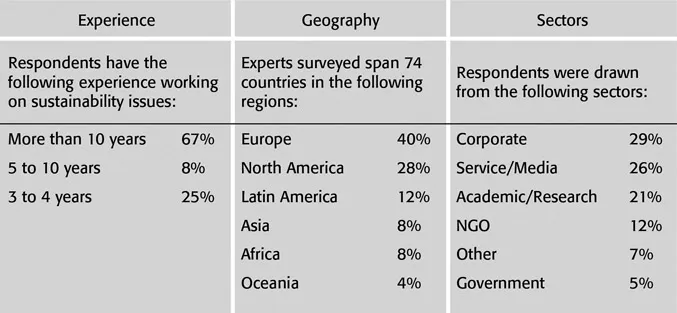![]()
Part one
The evolution of corporate sustainability leadership
![]()
1
Twenty years of the GlobeScan-SustainAbility Leaders Survey
“Every body perseveres in its state of being at rest or of moving uniformly straight forward, except insofar as it is compelled to change its state by forces impressed.”
Sir Isaac Newton
At the heart of this book is a belief that corporate leadership in sustainability isn’t just a new management fad but the only way to be a successful business in the long-term. Companies can only aspire to survive into the indefinite future if they help society find solutions to the most acute environmental, social, and economic challenges we face. There is also a moral imperative for business leadership in sustainability.
Corporate sustainability leadership provides incredible business opportunities too: it reduces risks, it enhances brand equity, it increases attraction and retention of talent, and it provides a lens for innovation that meets customer needs. According to the Business and Sustainable Development Commission, there will be at least a $12 trillion opportunity available to companies delivering on the United Nations’ 17 Sustainable Development Goals (SDGs) through 2030,1 and the best evidence suggests that strong corporate sustainability performance drives better financial returns in the long run.2
Business also needs a social license to operate. Given the perniciously low trust in business across societies, corporate motives and actions are increasingly contested, often eroding the private sector’s ability to lead. Rebuilding trust with society is a critical priority for many CEOs around the world. According to recent GlobeScan global public opinion research,3 there remains low trust in global companies, but also in national governments and especially the press and media, making it harder to engage in broad societal debates on the role of institutions in society. This partly explains the “post-truth” context we are living in (see Figure 1.1). Further, there is a significant and growing gap between societal expectations for corporate responsibility and perceived corporate performance (see Figure 1.2). It is this gap that business leaders must address to create better conditions for trust and growth.
There are different ways to assess or measure corporate performance in sustainability, from established ratings such as the Dow Jones Sustainability
Figure 1.1 Trust in Institutions
Figure 1.2 Expectations vs. Performance for Responsible Business (2001–2017)
Index (DJSI) or the FTSE4Good, to various NGO rankings such as Behind the Brands, the Access to Medicine Index, or the Guide to Greener Electronics. But another way to identify stellar performance is to have sustainability experts identify which companies are leaders and why.
Through the GlobeScan-SustainAbility Leaders Survey, we have engaged global experts in sustainability from business, NGOs, government, and academia to help us identify corporate leaders on an annual basis. The diverse nature of our stakeholder panel, combined with a simple quantitative approach, has been a powerful barometer of the state of sustainable leadership since 1997.
The findings of the Leaders Survey, comprised of the views of thousands of experts from over 100 countries across two decades, are rich and revealing:
- 51 companies have been included in the top 15 over the twenty years
- 13 companies have appeared in the top 15 ranking in ten or more years4
- 6 companies have held the top leadership position
- 20 sectors have been represented
- 11 home countries have been represented.5
The wisdom of the crowd provides a unique lens to explore corporate sustainability leadership. The Leaders Survey has been asking experts not only to identify leading companies in sustainability, but also why they believe these companies are leaders, how they see the sustainable development agenda evolving, and what the priorities are going forward.
Since the launch of our first Leaders Survey report in 1997, we have seen our respondent pool grow to become a global cohort representing experienced sustainable development experts from all continents. From a small, finely targeted survey on what at the time was a niche topic, the Leaders Survey has become one of the most respected global studies tracking perceptions of organizational performance in areas related to the environment, society, and the economy.
The core question we have been analyzing is: “What specific companies do you think are leaders in integrating sustainability into their business strategy?” We ask experts to name up to three companies that fit this profile, why they believe the companies are leaders, and then aggregate the results. We look at the results across time, by stakeholder audience and geography, and draw conclusions on what this means for the evolving state of corporate sustainability leadership. In this book, we share publicly for the first time all of the tracking data we have accumulated over the past 20 years.
What good looks like
Our 2017 Leaders Survey results, based on responses from over 1,000 experts in 79 countries, showcase a set of companies that are demonstrating corporate leadership across environmental, social, and economic dimensions. (Please see Figure 1.3 for a breakdown of the sample from the 2017 study.)
Figure 1.3 GlobeScan-SustainAbility Leaders Survey: Methodology 2017 1,035 Qualified Sustainability Experts Completed the Survey, 2017
For the seventh year in a row, Unilever is ranked as the premier global sustainability leader, receiving nearly half the total mentions (45%) by global experts. Patagonia and Interface occupy the second and third positions (23% and 11%, respectively), with IKEA (8%), Natura (7%), M&S (7%), Tesla (7%), Nestlé (6%), Nike (3%), GE (3%), and BASF (3%) rounding out the top mentioned companies.6
The Leaders Survey rankings differ somewhat by region. The European and North American ratings are largely similar to those of the global findings, with the exception that Novo Nordisk, Coca-Cola, Siemens, and Trio-dos Bank get mentions in Europe, and Starbucks breaks into the top cadre in North America.
Unilever and Patagonia are perceived as leaders in most parts of the world. Latin America is the only region to have a home-grown company, Natura, the Brazilian cosmetics company committed to sustainable sourcing from the Amazon, ranked as the top sustainability leader. ARCOR, the Argentine food company, is also recognized as a leading company among Latin American stakeholders.
Woolworth’s, the South African retailer with historic ties to M&S, breaks into the top three among African respondents. Nestlé has its strongest leadership positioning in Africa, perhaps a testament to the company’s significant Creating Shared Value investments in smallholder farmers across the region.
In Asia, experts recognize Unilever, Patagonia, Nestlé, IKEA, Natura, BASF, and M&S as top leaders. The only Asia-based company to break through there is the Tata Group. Procter & Gamble (P&G) also uniquely gets mentioned as a leader in this region.7
In Australia and New Zealand, Unilever, Patagonia, and Interface occupy the top three leadership positions, consistent with the global sample. But experts in Oceania differ from other regions in mentioning Siemens with greater frequency. They also uniquely mention BMW, Dow, Puma, and Westpac – the only other bank apart from Triodos in Europe mentioned anywhere – as leading companies in sustainability.
Views of corporate leadership vary slightly by stakeholder audience. Experts from the NGO sector, for instance, while pointing to Unilever and Patagonia as the top two leaders, are more likely to mention Tesla as a leading company than other stakeholder audiences. Government stakeholders, in contrast, give slightly lower ratings to Unilever and distribute second place between Patagonia, IKEA, and Walmart. Academics are unique in mentioning BASF and Siemens, while corporate stakeholders stand out in giving the highest ratings to Unilever.
Three dominant leaders today
Overall, the survey has shown that values, committed executive leadership, and making sustainability part of their core operations is what has earned corporate leaders’ admiration from experts to date. But drivers of recognized leadership vary and tend to be quite specific. A review of the three companies that currently dominate positive perceptions of corporate sustainability leadership – Unilever, Patagonia, and Interface – provides more insight into the drivers of leadership.
Unilever, the large Anglo-Dutch consumer goods company founded in 1872, is the most commanding corporate leader in the Leaders Survey’s history, with its margin of victory in the survey increasing each year since it first took pole position in 2011. There are a number of factors that are driving this: the company’s purposeful approach to business, a corporate culture conducive to sustainability, the company’s ambitious Sustainable Living Plan, involvement in a significant number of partnerships and collaborations, and the role of Paul Polman, Unilever’s CEO, as a tireless advocate for the full sustainability agenda, working not only to drive his company’s business model toward a sustainable footing, but also to change the systemic conditions needed for the transition.
When asked why they believe Unilever is a leader, experts from the Leaders Survey cite a range of reasons:
- Unilever has “integrated sustainability practices – both social and environmental – throughout their operations,”
- The company’s “sourcing practices for ingredients with attention to the triple bottom line: economic benefit for smallholders, social benefits, environmental considerations,”
- Unilever “has demonstrated that sustainability is driving its business growth and that its brands are benefiting from having a sustainable purpose as well as a societal benefit,” and
- The CEO has “visionary leadership that takes a long view.”8
Patagonia, the American outdoor clothing company founded by Yves Chouinard in 1973, has also risen through the leadership ranks over the past decade. It was first identified by stakeholders as a leader in 2007 and has steadily improved its standing since. Patagonia is now considered among the most sustainable companies by one in four experts surveyed.
Stakeholders cite Patagonia as a leader because:
- It believes that “sustainability isn’t a business effort, it’s a mission statement that permeates all departments,”
- “Its strategic goal is to contribute to sustainable development and this goal cannot be overwritten by market or financial goals,”
- The company’s leadership stems from its “change in the business model in order to minimize demand for natural resources and to induce products to be used up to the end of life,”
- The fact that Patagonia is “an activist company [that] uses public and private partnerships to improve the supply chain and life cycle of the fashion, garment and outdoor retailing industry,” and
- “Sustainability is core to their business goals. They seem to be as integrated a company as any I can think of.”
Interface, the largest commercial carpet company in the world, founded in 1973 by Ray Anderson, placed in the top cohort of leadership yet again in 2017, something it has achieved every year since the survey’s inception. Interface is the only company to have done this, which reflects the remarkable dedication the company has demonstrated in pursuit of a more sustainable business model since the 1990s. From its long-term Mission Zero strategy focused on having a fully closed-loop approach to industrial production to its current Climate Take Back c...



